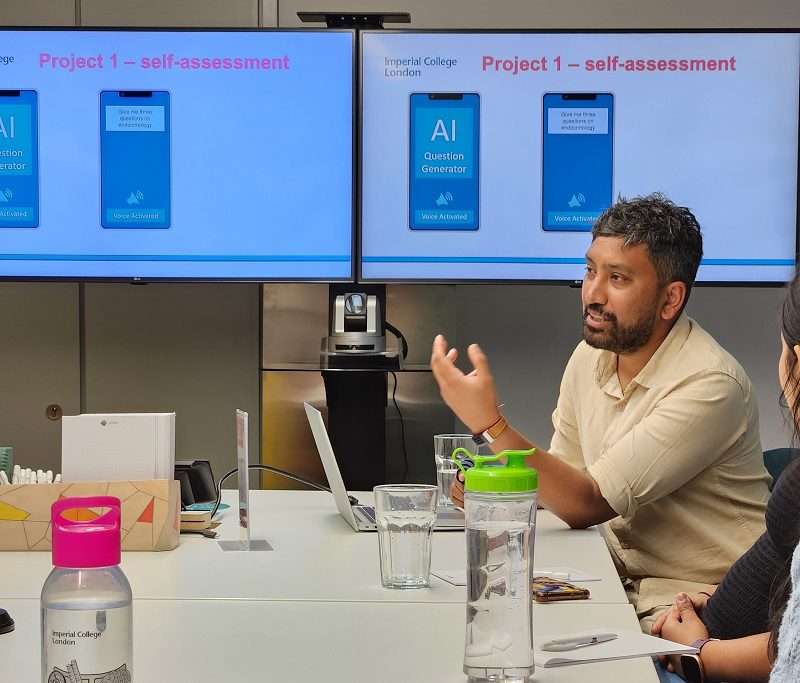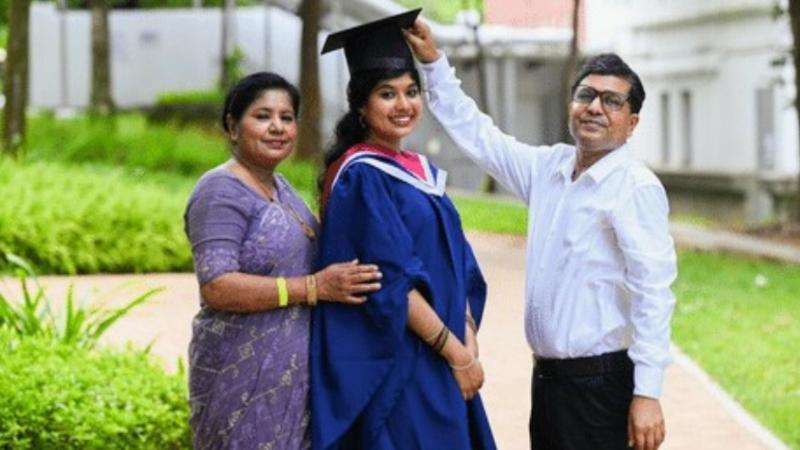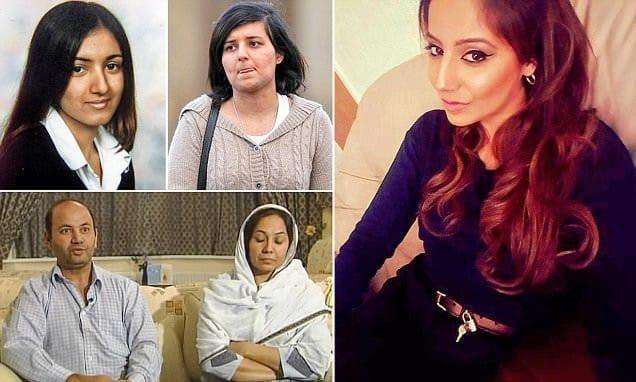[caption id="attachment_781" align="alignleft" width="900"]

From left, Kelina, Khushi, myself, Akshita and Kirthana[/caption]
The word "Imperial" has many connotations associated with it. Imperial is a word frequently associated with the Star Wars movie series in the fictional universe. As the 6th best university in the world by QS ranking and the 10th best by Times Higher Education, it is, however, a respectable and recognizable name that frequently draws attention in the academic world.
Numerous scientists of British Bangladeshi origin are working across the UK, barely receiving any recognition for their significant contributions. Of late, though, a scientist of Bangladeshi origin has been instrumental in making a major impact on the realm of STEM at Imperial.
It is unusual for medical schools to integrate non-prescriptive coursework. However, in 2017, a breakthrough module was introduced at the Faculty of Medicine, Imperial College London, through which students could gain real-life research and job experience whilst studying.
Bangladeshi-British scientist Dr Sohag Saleh, Deputy Director at the Faculty of Medicine at Imperial, was behind the creation of this module, Clinical Research and Innovation (CRI). He has led a team of international scientists and lecturers at Imperial, greatly enhancing the curriculum. As a fellow scientist, this writer has collaborated with Sohag for the past seven years to offer research opportunities to students.
The CRI module enables second-year (Phase 1b) students to select a three-week experience, developing skills in various laboratory, clinical, non-clinical, and community settings. Professors and technology experts within the faculty lead the experiences. For this module, the students must complete quantitative or qualitative research projects within a month. And for their final exam, students deliver a presentation to an academic panel.
[caption id="attachment_782" align="alignleft" width="800"]

Dr Sohag Saleh giving an introductory lecture to this year's students[/caption]
The extraordinary talents
As the Research Lead for the 'Technology Basket,' students receive the opportunity to work on emerging and breakthrough technologies under my guidance. Over the past years, Sohag and I have led research projects involving computational neuroscience, artificial intelligence and blockchain.
In 2017, for instance, six students collected Electroencephalogram (EEG) data from respondents who were given Virtual Reality (VR) headsets. Two teams conducted a study to compare the impact of VR and 2D videos, and the results found a noticeable difference in participant reactions.
Over the years, some students have gone beyond their traditional means of carrying out research studies. In 2021, one of my teams developed an application using Python simply to automate the process of collecting data.
For this year, the idea was to design research around ChatGPT, as its accelerated growth has everyone dumbfounded. However, after a long discussion on ethics, we decided to concentrate on the underlying technology rather than the hype.
The two groups of four that Sohag and I taught in 2023 were nothing but extraordinary. As their Research Lead, I spent most of my time managing the team, running training sessions, and instructing them on cutting-edge methodologies. To that end, I coordinated the participation of three companies—Plexal, Altiverse, and Barclays Eagle Lab—to provide students with an education in entrepreneurship. Plexal's CEO, Andrew Roughan's contribution has also been instrumental for the past two years.
In 2023, team NUTRISCAN developed an artificial intelligence-powered application to analyse food images for macro-nutrient content using the camera app.
They employed a Convolutional Neural Network to facilitate the process, a kind of artificial intelligence and conducted their research to understand the influence of their product. Team LUCID, involving Emily, Aaqil, Paniz and Callum, created an app that can capture images from a poster and make them more accessible using Optical Character Recognition (OCR) to users with vision impairments or special requirements, such as dyslexia.
A Breakthrough in Medicine Curriculum
Despite Imperial's rapid advancement over the past century, CRI has been recognised as a groundbreaking educational segment. Learning to memorise large amounts of information is crucial for medical students. However, there is more to medicine than purely memorisation and treatment. Dr Saleh, in this regard, says,
"This module is an outstanding opportunity for students to gain exposure to science and medicine outside of the classroom. It teaches science and research, but in the broader context of the importance of research in meeting the healthcare needs of society, and how the students can play a role in that in the future."
A gateway to the world of startups
Much of the programme is committed to giving students a glimpse into their potential future. Kelina, Kirthana, Akshita and Khushi, who developed the NUTRISCAN application, believe that it was a lifetime opportunity, as technology would dominate the field of medicine.
"Everything is now online in terms of NHS General Practitioners (GPs) accessing resources," said Kelina Lowther-Harris, one of the future doctors from this group.
"I believe there will be a big increase in AI-enabled applications for the public and patient, rather than for the healthcare professionals to use it."
Choosing their research direction is also vital at this time of their degree. "I was quite surprised by how much freedom we had with this project," said Aaqil Favas from LUCID. "These few weeks taught us a lot about the actual process for startup and tech companies. And the talks have been really interesting, especially with Plexal and Barclays Eagle Lab."
Inspiring young, future doctors
In 2017, Sohag created an opportunity that opened doors for prospective doctors, enabling them to recognise their profession's immense influence when they make the right career decision. Many graduate students are now pursuing careers in research, as scientists, or as entrepreneurs, all of which demand a wide range of skills. One of the team members from NUTRISCAN, Kirthana, expressed gratitude at the end of CRI for providing her team with the 'soft skills' they will need in the future.
Through CRI, they are equipped with the intelligence and abilities to bring new technologies to life, including app development, user interface design, research, and communication skills.
Even if it is a small contribution to the scientific world, these responsibilities are arduous to manage, and many British Bangladeshi professionals play decisive roles in advancing scientific breakthroughs. For the writer, it's been a delight working with Sohag, and he'd want to see other people of Bangladeshi descent like him forge the road to progress.
Farabi Shayor is the Head of Research at IntelXSys, and a Research Lead for the CRI module at the Faculty of Medicine, Imperial College London. He is a British resident of Bangladeshi descent, a published author, and a Chartered Scientist, recognised by the Science Council in the UK.
 From left, Kelina, Khushi, myself, Akshita and Kirthana[/caption]
The word "Imperial" has many connotations associated with it. Imperial is a word frequently associated with the Star Wars movie series in the fictional universe. As the 6th best university in the world by QS ranking and the 10th best by Times Higher Education, it is, however, a respectable and recognizable name that frequently draws attention in the academic world.
Numerous scientists of British Bangladeshi origin are working across the UK, barely receiving any recognition for their significant contributions. Of late, though, a scientist of Bangladeshi origin has been instrumental in making a major impact on the realm of STEM at Imperial.
It is unusual for medical schools to integrate non-prescriptive coursework. However, in 2017, a breakthrough module was introduced at the Faculty of Medicine, Imperial College London, through which students could gain real-life research and job experience whilst studying.
Bangladeshi-British scientist Dr Sohag Saleh, Deputy Director at the Faculty of Medicine at Imperial, was behind the creation of this module, Clinical Research and Innovation (CRI). He has led a team of international scientists and lecturers at Imperial, greatly enhancing the curriculum. As a fellow scientist, this writer has collaborated with Sohag for the past seven years to offer research opportunities to students.
The CRI module enables second-year (Phase 1b) students to select a three-week experience, developing skills in various laboratory, clinical, non-clinical, and community settings. Professors and technology experts within the faculty lead the experiences. For this module, the students must complete quantitative or qualitative research projects within a month. And for their final exam, students deliver a presentation to an academic panel.
[caption id="attachment_782" align="alignleft" width="800"]
From left, Kelina, Khushi, myself, Akshita and Kirthana[/caption]
The word "Imperial" has many connotations associated with it. Imperial is a word frequently associated with the Star Wars movie series in the fictional universe. As the 6th best university in the world by QS ranking and the 10th best by Times Higher Education, it is, however, a respectable and recognizable name that frequently draws attention in the academic world.
Numerous scientists of British Bangladeshi origin are working across the UK, barely receiving any recognition for their significant contributions. Of late, though, a scientist of Bangladeshi origin has been instrumental in making a major impact on the realm of STEM at Imperial.
It is unusual for medical schools to integrate non-prescriptive coursework. However, in 2017, a breakthrough module was introduced at the Faculty of Medicine, Imperial College London, through which students could gain real-life research and job experience whilst studying.
Bangladeshi-British scientist Dr Sohag Saleh, Deputy Director at the Faculty of Medicine at Imperial, was behind the creation of this module, Clinical Research and Innovation (CRI). He has led a team of international scientists and lecturers at Imperial, greatly enhancing the curriculum. As a fellow scientist, this writer has collaborated with Sohag for the past seven years to offer research opportunities to students.
The CRI module enables second-year (Phase 1b) students to select a three-week experience, developing skills in various laboratory, clinical, non-clinical, and community settings. Professors and technology experts within the faculty lead the experiences. For this module, the students must complete quantitative or qualitative research projects within a month. And for their final exam, students deliver a presentation to an academic panel.
[caption id="attachment_782" align="alignleft" width="800"] Dr Sohag Saleh giving an introductory lecture to this year's students[/caption]
The extraordinary talents
As the Research Lead for the 'Technology Basket,' students receive the opportunity to work on emerging and breakthrough technologies under my guidance. Over the past years, Sohag and I have led research projects involving computational neuroscience, artificial intelligence and blockchain.
In 2017, for instance, six students collected Electroencephalogram (EEG) data from respondents who were given Virtual Reality (VR) headsets. Two teams conducted a study to compare the impact of VR and 2D videos, and the results found a noticeable difference in participant reactions.
Over the years, some students have gone beyond their traditional means of carrying out research studies. In 2021, one of my teams developed an application using Python simply to automate the process of collecting data.
For this year, the idea was to design research around ChatGPT, as its accelerated growth has everyone dumbfounded. However, after a long discussion on ethics, we decided to concentrate on the underlying technology rather than the hype.
The two groups of four that Sohag and I taught in 2023 were nothing but extraordinary. As their Research Lead, I spent most of my time managing the team, running training sessions, and instructing them on cutting-edge methodologies. To that end, I coordinated the participation of three companies—Plexal, Altiverse, and Barclays Eagle Lab—to provide students with an education in entrepreneurship. Plexal's CEO, Andrew Roughan's contribution has also been instrumental for the past two years.
In 2023, team NUTRISCAN developed an artificial intelligence-powered application to analyse food images for macro-nutrient content using the camera app.
They employed a Convolutional Neural Network to facilitate the process, a kind of artificial intelligence and conducted their research to understand the influence of their product. Team LUCID, involving Emily, Aaqil, Paniz and Callum, created an app that can capture images from a poster and make them more accessible using Optical Character Recognition (OCR) to users with vision impairments or special requirements, such as dyslexia.
A Breakthrough in Medicine Curriculum
Despite Imperial's rapid advancement over the past century, CRI has been recognised as a groundbreaking educational segment. Learning to memorise large amounts of information is crucial for medical students. However, there is more to medicine than purely memorisation and treatment. Dr Saleh, in this regard, says,
"This module is an outstanding opportunity for students to gain exposure to science and medicine outside of the classroom. It teaches science and research, but in the broader context of the importance of research in meeting the healthcare needs of society, and how the students can play a role in that in the future."
A gateway to the world of startups
Much of the programme is committed to giving students a glimpse into their potential future. Kelina, Kirthana, Akshita and Khushi, who developed the NUTRISCAN application, believe that it was a lifetime opportunity, as technology would dominate the field of medicine.
"Everything is now online in terms of NHS General Practitioners (GPs) accessing resources," said Kelina Lowther-Harris, one of the future doctors from this group.
"I believe there will be a big increase in AI-enabled applications for the public and patient, rather than for the healthcare professionals to use it."
Choosing their research direction is also vital at this time of their degree. "I was quite surprised by how much freedom we had with this project," said Aaqil Favas from LUCID. "These few weeks taught us a lot about the actual process for startup and tech companies. And the talks have been really interesting, especially with Plexal and Barclays Eagle Lab."
Inspiring young, future doctors
In 2017, Sohag created an opportunity that opened doors for prospective doctors, enabling them to recognise their profession's immense influence when they make the right career decision. Many graduate students are now pursuing careers in research, as scientists, or as entrepreneurs, all of which demand a wide range of skills. One of the team members from NUTRISCAN, Kirthana, expressed gratitude at the end of CRI for providing her team with the 'soft skills' they will need in the future.
Through CRI, they are equipped with the intelligence and abilities to bring new technologies to life, including app development, user interface design, research, and communication skills.
Even if it is a small contribution to the scientific world, these responsibilities are arduous to manage, and many British Bangladeshi professionals play decisive roles in advancing scientific breakthroughs. For the writer, it's been a delight working with Sohag, and he'd want to see other people of Bangladeshi descent like him forge the road to progress.
Farabi Shayor is the Head of Research at IntelXSys, and a Research Lead for the CRI module at the Faculty of Medicine, Imperial College London. He is a British resident of Bangladeshi descent, a published author, and a Chartered Scientist, recognised by the Science Council in the UK.
Dr Sohag Saleh giving an introductory lecture to this year's students[/caption]
The extraordinary talents
As the Research Lead for the 'Technology Basket,' students receive the opportunity to work on emerging and breakthrough technologies under my guidance. Over the past years, Sohag and I have led research projects involving computational neuroscience, artificial intelligence and blockchain.
In 2017, for instance, six students collected Electroencephalogram (EEG) data from respondents who were given Virtual Reality (VR) headsets. Two teams conducted a study to compare the impact of VR and 2D videos, and the results found a noticeable difference in participant reactions.
Over the years, some students have gone beyond their traditional means of carrying out research studies. In 2021, one of my teams developed an application using Python simply to automate the process of collecting data.
For this year, the idea was to design research around ChatGPT, as its accelerated growth has everyone dumbfounded. However, after a long discussion on ethics, we decided to concentrate on the underlying technology rather than the hype.
The two groups of four that Sohag and I taught in 2023 were nothing but extraordinary. As their Research Lead, I spent most of my time managing the team, running training sessions, and instructing them on cutting-edge methodologies. To that end, I coordinated the participation of three companies—Plexal, Altiverse, and Barclays Eagle Lab—to provide students with an education in entrepreneurship. Plexal's CEO, Andrew Roughan's contribution has also been instrumental for the past two years.
In 2023, team NUTRISCAN developed an artificial intelligence-powered application to analyse food images for macro-nutrient content using the camera app.
They employed a Convolutional Neural Network to facilitate the process, a kind of artificial intelligence and conducted their research to understand the influence of their product. Team LUCID, involving Emily, Aaqil, Paniz and Callum, created an app that can capture images from a poster and make them more accessible using Optical Character Recognition (OCR) to users with vision impairments or special requirements, such as dyslexia.
A Breakthrough in Medicine Curriculum
Despite Imperial's rapid advancement over the past century, CRI has been recognised as a groundbreaking educational segment. Learning to memorise large amounts of information is crucial for medical students. However, there is more to medicine than purely memorisation and treatment. Dr Saleh, in this regard, says,
"This module is an outstanding opportunity for students to gain exposure to science and medicine outside of the classroom. It teaches science and research, but in the broader context of the importance of research in meeting the healthcare needs of society, and how the students can play a role in that in the future."
A gateway to the world of startups
Much of the programme is committed to giving students a glimpse into their potential future. Kelina, Kirthana, Akshita and Khushi, who developed the NUTRISCAN application, believe that it was a lifetime opportunity, as technology would dominate the field of medicine.
"Everything is now online in terms of NHS General Practitioners (GPs) accessing resources," said Kelina Lowther-Harris, one of the future doctors from this group.
"I believe there will be a big increase in AI-enabled applications for the public and patient, rather than for the healthcare professionals to use it."
Choosing their research direction is also vital at this time of their degree. "I was quite surprised by how much freedom we had with this project," said Aaqil Favas from LUCID. "These few weeks taught us a lot about the actual process for startup and tech companies. And the talks have been really interesting, especially with Plexal and Barclays Eagle Lab."
Inspiring young, future doctors
In 2017, Sohag created an opportunity that opened doors for prospective doctors, enabling them to recognise their profession's immense influence when they make the right career decision. Many graduate students are now pursuing careers in research, as scientists, or as entrepreneurs, all of which demand a wide range of skills. One of the team members from NUTRISCAN, Kirthana, expressed gratitude at the end of CRI for providing her team with the 'soft skills' they will need in the future.
Through CRI, they are equipped with the intelligence and abilities to bring new technologies to life, including app development, user interface design, research, and communication skills.
Even if it is a small contribution to the scientific world, these responsibilities are arduous to manage, and many British Bangladeshi professionals play decisive roles in advancing scientific breakthroughs. For the writer, it's been a delight working with Sohag, and he'd want to see other people of Bangladeshi descent like him forge the road to progress.
Farabi Shayor is the Head of Research at IntelXSys, and a Research Lead for the CRI module at the Faculty of Medicine, Imperial College London. He is a British resident of Bangladeshi descent, a published author, and a Chartered Scientist, recognised by the Science Council in the UK.




_3.jpg)


.svg)


_2.jpg)